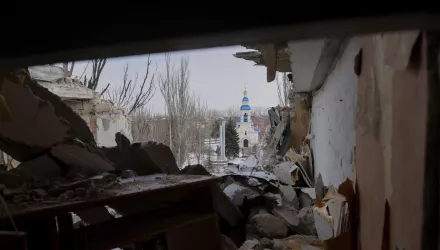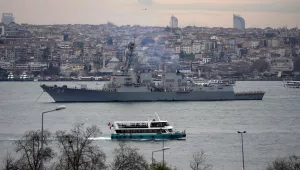On March 6, 2014, former Minister of Defense and current Polish senator, Bogdan Klich, led a seminar to examine expectations of the September 2014 NATO Summit in Wales, as part of the program’s annual “Europe Week.” Klich, who served as Defense Minister between 2007-2011 elaborated on NATO operations and the altered core functions and operations, particularly after the ISAF mission was drawing to a close in Afghanistan. NATO’s new missions and the subsequent responsibilities were reshaping the traditional composition of the transatlantic link, he noted.
Highlighting three main focal points from a Polish, but moreover greater European perspective, Minister Klich outlined the current state of NATO, its security operations, and their ongoing negotiations with U.S. and European Union. Noting that the landscape had changed on multiple fronts, Minister Klich indicated that the recent global financial crisis “came as a storm to Europe,” forcing many defense ministries to reduce budgets and operational capacities. Recalling a 2009 meeting of EU Ministers of Defense, the group sentiment reinforced the need for a multinational approach to security, creating both opportunities and challenges for NATO. He warned that a blanket reduction of defense spending could have serious effects for the NATO alliance and cautioned against “burden sharing” initiatives that might seem too eager to limit strategic ground operations.
Reflecting on the agenda for the upcoming summit, Minister Klich highlighted three topics: maintaining the interoperability of NATO forces after Afghanistan; discussing the new direction of NATO policy with a focus on “reshaping their approach to action;” and selecting a new Secretary-General of NATO, a position where “experiences and personal relations can prove useful” in being more accessible to members.
Klich went on to speak of potential operational issues of NATO, matters that might be compounded by the rise crisis situations like those seen in Ukraine. Yet he expressed confidence that NATO would be able to adapt. A firm believer of having a “global network of partnerships,” Minister Klich noted that NATO was moving towards a more interconnected collaboration that was focused not on global commitments or occupations, but rather on flexible, cooperative organizations that were able to adjust to worldwide needs.
Lee, John. “Expectations of the Next NATO Summit: Altered Core Functions, Operations, and a Redefinition of the Transatlantic Link.” March 12, 2014


